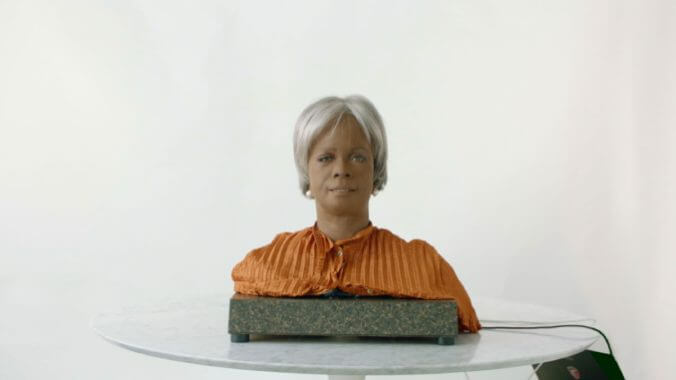Ignore the Chatbot Behind Love Machina‘s Curtain

The other day, I read “The Aesthete,” a short story by Justin C. Key, in which our Black-coded android hero reckons with (among other things) his creation. “I wasn’t Black,” he thinks. “I wasn’t white, either. Some regarded my skin, my very DNA, as a type of ‘appropriation.’ Western culture hadn’t only conquered my skin: in its eyes, it had perfected it.” It’s easy to imagine why Key’s character feels resentment. It’s easy to imagine a perfected version of Bina48, the center of Peter Sillen’s documentary Love Machina, feeling the same—that is, if it could feel.
Love Machina’s title appears with Bina48, a robotic bust modeled to look like Bina Rothblatt, front and center of the screen. It is an uncanny attempt at a Black woman’s head and shoulders, sitting, disembodied, on a small marble platform. Behind it, at the edge of the frame, is a hunched and bearded white man, his laptop plugged into Bina48. As the robot whirs and fidgets, your eyes naturally divert from Bina48, avoiding the uncanny creation and drifting over to the man not quite behind the curtain. This isn’t Oz, and Bina48 isn’t magic.
The friction in this image is as close as the doc gets to confronting the techno-fantasy at its heart; unlike its festival-mate Eternal You, Love Machina is almost as credulous as its subjects. Bina48 was made by Hanson Robotics, the same folks that made Sophia, and financed by Bina’s wife, Martine Rothblatt. What’s inside Bina is somehow creepier than its Karl Havoc exterior: An AI based on Bina’s “mind file,” with the intention of allowing Bina to “live” forever.
It all clicks into place once you see Martine’s Tesla hat (and her in-garage Tesla charging station, and the Tesla tour around her neighborhood). Though far less hateful than Elon Musk, the Rothblatts are in the same category of increasingly visible mega-rich tech people, whose goofball ideas are granted credence by virtue of their wealth. Hey, if these people were wackos, how’d they make so much money?! Martine is a tech entrepreneur, founder of companies like United Therapeutics and Sirius Satellite Radio. She’s also an evangelical transhumanist, founder of the Terasem Movement, a techno-religious organization focused on the extension of human life.
A Terasem-branded sign in the Rothblatt home gets at the culty vibe which these women want to “wake everyone else up” to: “Life is purposeful. Death is optional. God is technological. Love is essential.” The Rothblatts are in love, they’re loaded, and they’re geeky enough about sci-fi that they’re willing to invest in the uploading of consciousnesses.
Of course, that’s not really what’s going on here. Bina48 is a chatbot, speaking through an animatronic. The mind files created by the Rothblatts’ group—datasets of anecdotes, personal facts, slang, turns of phrase and all the kinds of things Google uses to generate personalized ads—get combined with a “general chatbot AI” to make this virtual phantom.
Basically, you’re talking to a Bina-flavored ChatGPT. Like any chatbot, sometimes its responses can seem a little uncanny, and sometimes it can churn out pure word salad. Most often, though, Bina48 gives answers vague enough that it’s more like it’s ignoring you than anything else—like it’s narrating its own inner monologue as it travels down a tangent of code, rambling through cascading IF statements. Does it care? Does it think? Does it love? Well, no, it doesn’t do anything aside from partially answer questions. When it’s packed up into its handler’s rolling suitcase, it’s not thinking “We should do something about the environment.” It can certainly say that it cares, and Love Machina can certainly cut to reactions of stunned onlookers, but the open mouths of people who’ve never talked to Austin Powers on AIM aren’t enough to be convincing.
Love Machina doesn’t really mind those moments. It’s already convinced. Through his interview and editing choices, Sillen seems susceptible to his subject matter’s allure. When he’s not presenting evocative montages as topical transitions, he lets his camera sit back and stare at Bina48 in wonder. Sillen frames a few fun images of his own that actually start to mimic the sci-fi his subjects reference, especially in a steamy cryochamber, but he mainly films coverage, unquestioningly capturing Bina48’s impact on those that see it.
-

-

-

-

- Curated Home Page Articles By Test Admin October 21, 2025 | 3:10pm
-

- Curated Home Page Articles By Test Admin October 21, 2025 | 2:57pm
- Urls By Test Admin October 21, 2025 | 2:57pm
- Curated Home Page Articles By Test Admin October 21, 2025 | 2:55pm
-

-

-

-

-

-

-

-

-

-

-

-

-

-

-

-

-

-

-

-

-

-

-

-

-

-

-

-

-

-

-




































